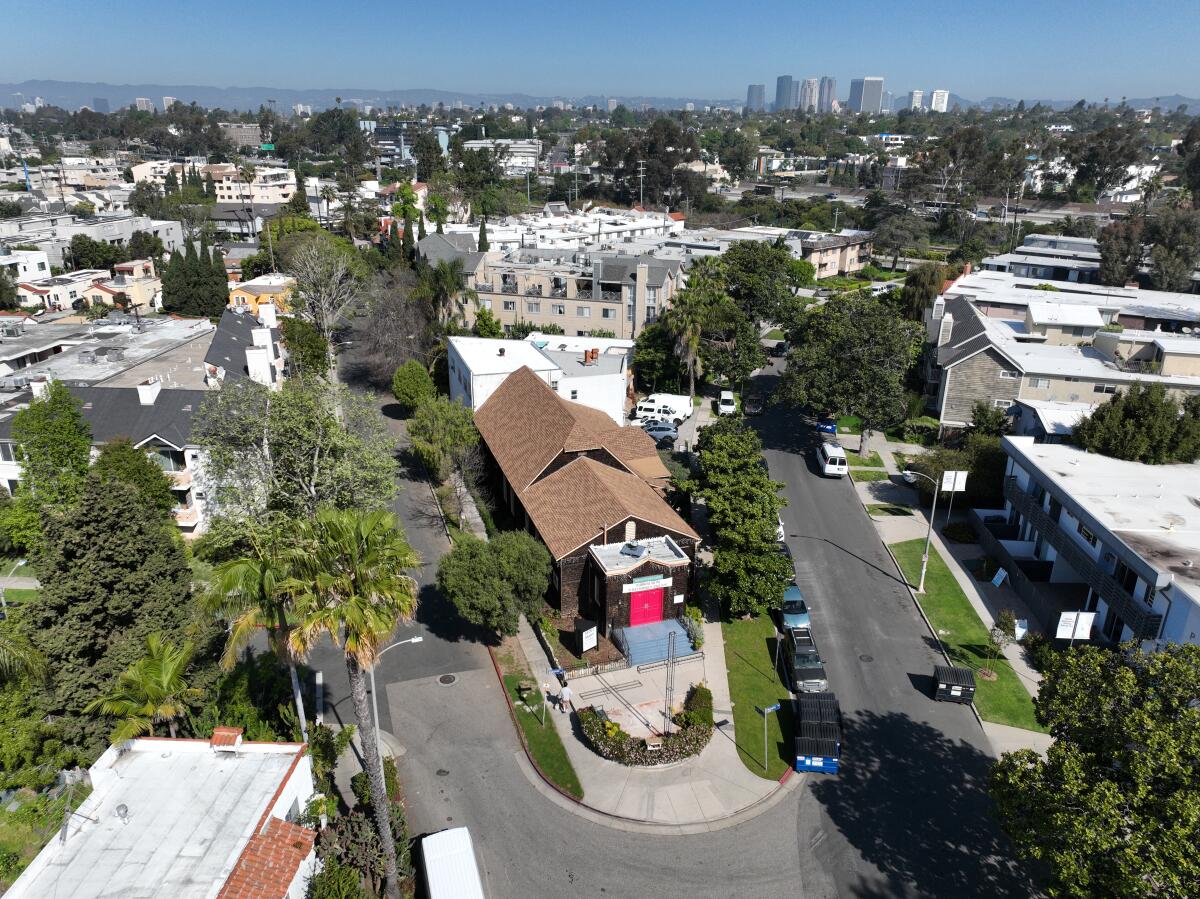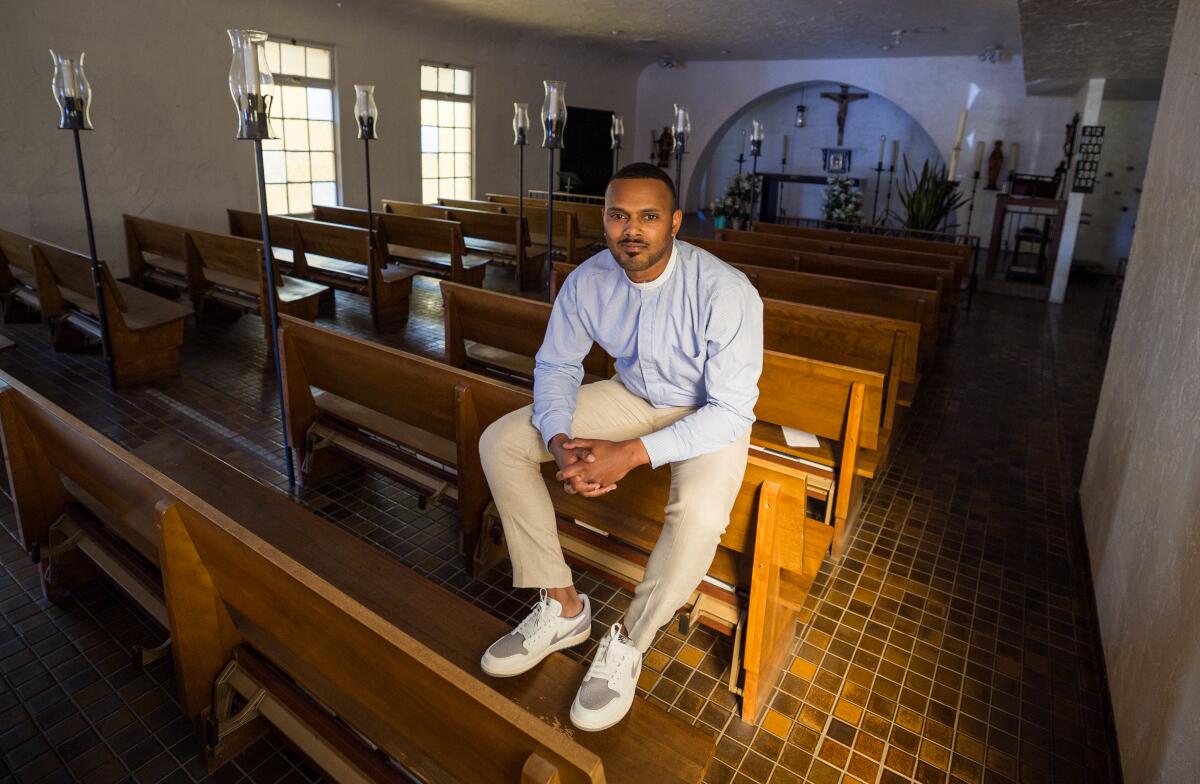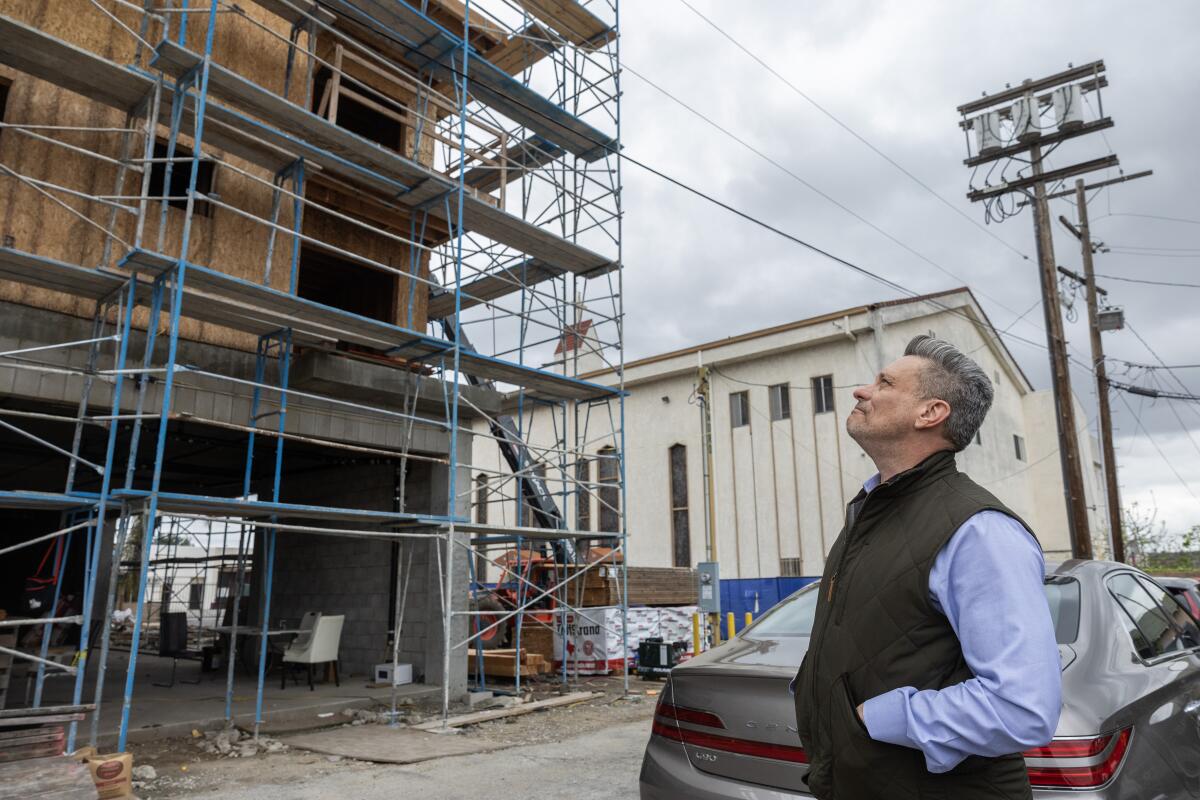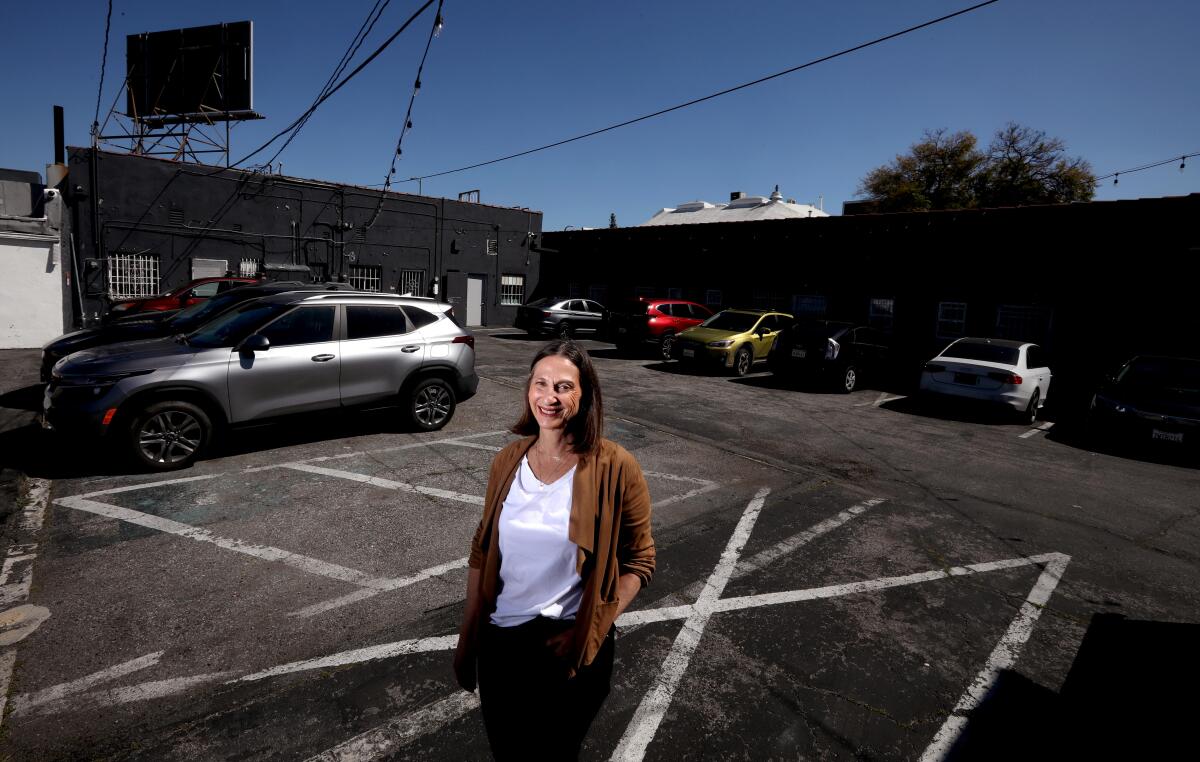
The Rev. Paul Anthony Daniels knows the names and life stories of the people who sleep in their cars near St. Mary’s, a century-old church in Palms.
In the past, homeless people spent the night in St. Mary’s Sunday School room.
So it wasn’t a big leap for Daniels to think about building affordable housing on church property.
A place to sleep, wash and cook “provides a basic dignity” that can change someone’s life and also help the neighborhood, Daniels said.
“The homeless are part of this community,” he added. “Not only in the sense that we house them, but also in the sense that they literally live around the property.”
In Los Angeles, some religious leaders are assessing their own properties, encouraged by new legislation making land development easier.
A California law that went into effect Jan. 1 allows affordable housing projects on land owned by churches, temples, mosques and other religious institutions to bypass an extensive review process and be built in single-family neighborhoods. The city of Los Angeles is considering other exemptions.

An aerial view of St. Mary in Palms, center, where part of the church-owned land could eventually be leased for affordable housing.
(Allen J. Schaben/Los Angeles Times)
In Los Angeles, where there is little vacant land, sky-high rents and a homeless population that topped 45,000 at the last census, affordable housing advocates see religious institutions — often land-rich but cash-poor — as an untapped resource.
For religious leaders, building their own homes could be a way to fulfill their mission of helping those in need. And with many congregations shrinking as Americans become less religious, revenue from such projects could help offset the decline in collection boxes.
But some real estate experts question whether many religious organizations will ultimately seek to build, given the commitment required from their members and boards. Years of construction near their sanctuaries could be a deterrent, as could opposition from neighbors.
Some cities, including Chino, Rancho Palos Verdes, Santa Clarita and Thousand Oaks, opposed the new state law as it was being debated in Sacramento. Lili Bosse, then mayor of Beverly Hills, said it would strip local governments of their power to control development, “undoing carefully crafted, locally informed plans.”
Leaders at St. Mary’s Episcopal Church, which has an Anglo-Catholic tradition, are beginning to explore the idea. The small congregation is tight-knit, with a few dozen people attending a typical Sunday service in the small, brown-shingled church. An affordable housing project would add to the church’s coffers, likely through rental fees paid by the developer.
The St. Mary’s property includes two main buildings, a house and six parking spaces on a narrow strip of land in a neighborhood of apartment buildings. Daniels, who has led St. Mary’s since 2022, said it was too early to say where on the property the new housing would be placed.

Rev. Paul Anthony Daniels, Rector of St. Mary in Palms.
(Allen J. Schaben/Los Angeles Times)
In South Los Angeles, where historically Black churches abound, many congregations are still suffering from the pandemic and declining attendance.
Regina Fair, a board member at Bethel AME-Los Angeles, said her church used to draw a few hundred people on Sundays, but now it’s limited to just one sermon.
Like other churches, Bethel AME, founded in 1921, has relied on live streaming during the pandemic lockdown and social media to reach younger people. All of that means less money in the collection basket.
“People are now willing to attend church from home, on their couch,” Fair said. “And when you’re not in church, it has a big impact on giving.”
Bethel AME, which fronts a stretch of South Western Avenue lined with businesses and apartment buildings, has embarked on a multiyear plan to develop affordable housing in its parking lot.
The 53-unit project, which benefited from city rules aimed at speeding up construction of affordable housing, will address the needs of some of the homeless who sleep in the church on cots during the winter. The church also plans to build housing on two neighboring parcels it owns.
Logos Faith Housing, which is co-developing the land, was started by a pastor to help churches build affordable housing. Bethel is leasing the land to a group of donors in what the church’s leader, the Rev. Kelvin T. Calloway, describes as a “perfect model” for generating income over a long period of time.
Calloway has seen gentrification change other South Los Angeles neighborhoods, leaving fewer people in churches. That’s not happening much yet in Bethel AME’s Manchester Square neighborhood, but “it’s a real possibility,” he said.

Pastor Martin Porter, managing partner of Logos Faith Development LLC, a real estate development company focused on partnering with faith-based entities, in the parking lot of Bethel AME Church in Los Angeles.
(Myung J. Chun/Los Angeles Times)
“Christianity is in crisis,” said Pastor Martin Porter, founder of Logos and leader of Quinn African Methodist Episcopal Church in Moreno Valley. “You see a lot of empty pews. The natural question is: What do you do with the surplus goods that aren’t being used?”
Bethel AME didn’t need the new state law, sponsored by state Sen. Scott Wiener (D-San Francisco), to develop its property.
But in Los Angeles, at least 600 sites owned by religious groups in single-family neighborhoods are now eligible for affordable housing, according to the city’s planning department. City officials could not provide information on applications filed under the law in the past eight months.
Wiener predicts it will take a few years for a substantial number of projects to get off the ground, particularly as religious institutions figure out how to approach the opportunity.
“They’re not usually major financial players,” he told the Times. “This is a church or a synagogue, not a development company.”
“This is a big deal,” said Pastor John Oh, director of the Faith in Housing Project at LA Voice, a community organization that supported the law.
Oh sees this as a potential “domino” that could lead to more zoning changes in single-family neighborhoods, which have long been considered by political leaders to be off-limits to multi-unit development.
The Los Angeles City Planning Department has proposed a version that, unlike the Wiener bill, does not require paying construction workers the prevailing wage or, on larger projects, providing them with health care.
The proposal, which is expected to go before City Council within the next six months, is aimed at appeasing affordable housing developers who say higher wages and benefits could increase their costs by 30%.
Unions, including the United Brotherhood of Carpenters, are opposed.
Pete Rodriguez, vice president of the brotherhood’s western district, called the proposal “outrageous” and suggested it could worsen the homelessness crisis by impoverishing workers.
“When will the city of Los Angeles realize that many of our problems, from homelessness to budget deficits, are caused by the simple fact that too many Angeles residents can’t make ends meet?” he said.
Wiener declined to comment on the city’s proposal. He said his law prioritizes protecting construction workers, who can be targets of wage theft.
Some development experts privately wonder whether religious entities in single-family neighborhoods will want to build affordable housing, in the face of possible resistance.
In Laguna Beach, residents are protesting a church’s plan to build affordable housing under the Wiener Act. A petition opposing the plan to build on the grounds of the neighborhood Congregational Church has garnered about 1,500 signatures.
“This affects the entire community by changing the character of the neighborhood and exacerbating existing problems such as traffic congestion and lack of parking,” the petition states.
But Bishop Lovester Adams, who leads Greater New St. Matthew Missionary Baptist Church in a single-family residential neighborhood in South Los Angeles, isn’t shying away from it. He called the Wiener bill and the city’s proposal “major changes.”
Adams, who is also a senior partner at Logos Development, said he can’t afford to build housing on his church’s parking lot at 36th and Crawford streets unless the city adopts the labor exemption.
The church, which dates back to the 1960s, is nestled among homes and duplexes. Church leaders regularly distribute food and toys to residents in need.
Attendance has declined since the pandemic, Adams said. Sunday services draw between 50 and 70 people, who fill less than half the seats. Some older people are staying away because of COVID-19 concerns.
Adams said he wants veterans to live in the new housing: “There’s a big need there.”

Melissa Balaban, CEO of IKAR, stands in the parking lot of the foundation where affordable housing will be developed in Los Angeles.
(Genaro Molina/Los Angeles Times)
On South Fairfax Avenue in Mid-Wilshire, Jewish congregation IKAR is building an affordable housing complex for formerly homeless seniors in its parking lot.
The project was built under Mayor Karen Bass’s Executive Directive 1, which accelerates the construction of affordable housing, said IKAR Executive Director Melissa Balaban. State legislation promoted by IKAR reduced the number of required parking spaces.
Balaban said IKAR was not counting on the project, which is funded by a nonprofit developer, to generate revenue for the congregation.
“I hope that what we are doing will not only provide 60 homes, but will also inspire other faith communities,” she said.
In Palms, Julia Bergstrom, 72, a member of St. Mary’s, is enthusiastic about the idea of affordable housing on the church property.
She has noticed that the number of people living in RVs goes up and down, and she finds the years-long wait to get Section 8 housing vouchers “immoral.”
Although she worries about the changes in the “very beautiful little church” she has attended since 2008, “it doesn’t stop me and it doesn’t make me sad about any of this,” she said.

